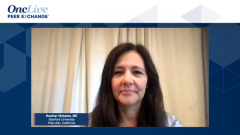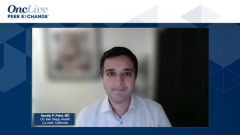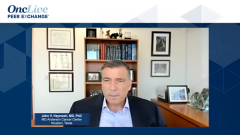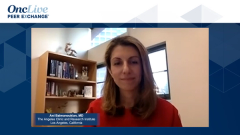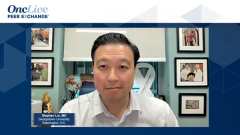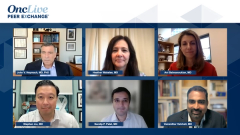
Treatment of Advanced NSCLC Following Progression on Immunotherapy
Lung cancer experts provide insight on updates from key clinical trials presented at ESMO 2021 on PD-1 inhibitor–resistant NSCLC.
Episodes in this series

John V. Heymach, MD, PhD: Briefly, I want people to comment on some of the studies in PD-L1 inhibitor–resistant disease because we did see some intriguing early results. Heather, 1 study that was presented is the combination of sitravatinib, which is a multitargeted TKI [tyrosine kinase inhibitor], and nivolumab. Do you want to briefly tell us about what was observed in that study?
Heather Wakelee, MD: Sure. We’ve been hearing bits about this for a while. Dr. Ticiana Leal, who’s at Emory University School of Medicine, has been the lead presenter and has been heavily involved. The sitravatinib is a multitargeted VEGFR [vascular endothelial growth factor receptor] TKI, and some of its other targets are this TAM family, so MER and AXL. That might play a role in its responses with immunotherapy. They took patients who had previously responded to a checkpoint inhibitor who had now progressed, and they received the sitravatinib plus nivolumab, and the response rate was 18%, some of which were a couple of complete responses. The duration of response was pretty good, so this is very encouraging. Like many of our multitargeted TKIs, there’s some toxicity: diarrhea, hypertension. Those are things we need to watch.
There have been some encouraging data, also with cabozantinib and atezolizumab—the VEGFR TKIs plus I/O [immuno-oncology], but we always wonder if it’s the VEGF part of the VEGFR TKIs or their other targets that they’re hitting. But this 1 looks pretty good. It’s at the forefront, so I continue to be encouraged.
John V. Heymach, MD, PhD: Another drug that had been studied in this setting is canakinumab. It’s an IL-1-beta antagonist. Vamsi, why don’t you tell us the results of that randomized study we saw presented for the first time.
Vamsidhar Velcheti, MD: It was a disappointing study. CANOPY-2 is a large phase 3 study evaluating the benefit of adding canakinumab, which is an IL-1-beta, to docetaxel in the second- and third-line setting. It was a largely negative study. It did not meet its primary and secondary end points. There was all excitement with this drug based on some of the observations made in the cardiovascular space, and unfortunately, we don’t see that pan out in the metastatic disease setting. However, there are other trials ongoing in the adjuvant and perioperative space. Stay tuned for updates from the drug, but so far, it’s been very disappointing.
John V. Heymach, MD, PhD: It’s too bad because it’s a brand-new target, and we hope we’re able to find a space for it. Finally, for this setting, Stephen, there were interesting data presented on the vaccine that we’ve not heard a lot about up to this point. Do you want to tell us about that?
Stephen Liu, MD: OSE-2101, or Tedopi, is a neoepitope vaccine. It’s targeting 5 tumor-associated antigens that are frequently expressed in lung cancer cells. This is restricted to patients with HLA-A2 haplotype, and what this did was randomized patients to OSE-2101 vs docetaxel. This study underwent a couple of different designs and statistics. It was launched before immunotherapy was standard for everyone. Enrollment became slow because of the pandemic. But when they looked at a population of interest, specifically those who had secondary resistance after sequential chemotherapy and then I/O, there did seem to be some benefit over docetaxel, with the hazard ratio of 0.59. In the overall population it wasn’t significant, but we’ll stay tuned and see what the next steps are in the development of this drug.
John V. Heymach, MD, PhD: Vaccines have obviously been tested for a long time, and they’re getting smarter and smarter as we go along. Hopefully this is something that can be incorporated in the near future.
Transcript Edited for Clarity


